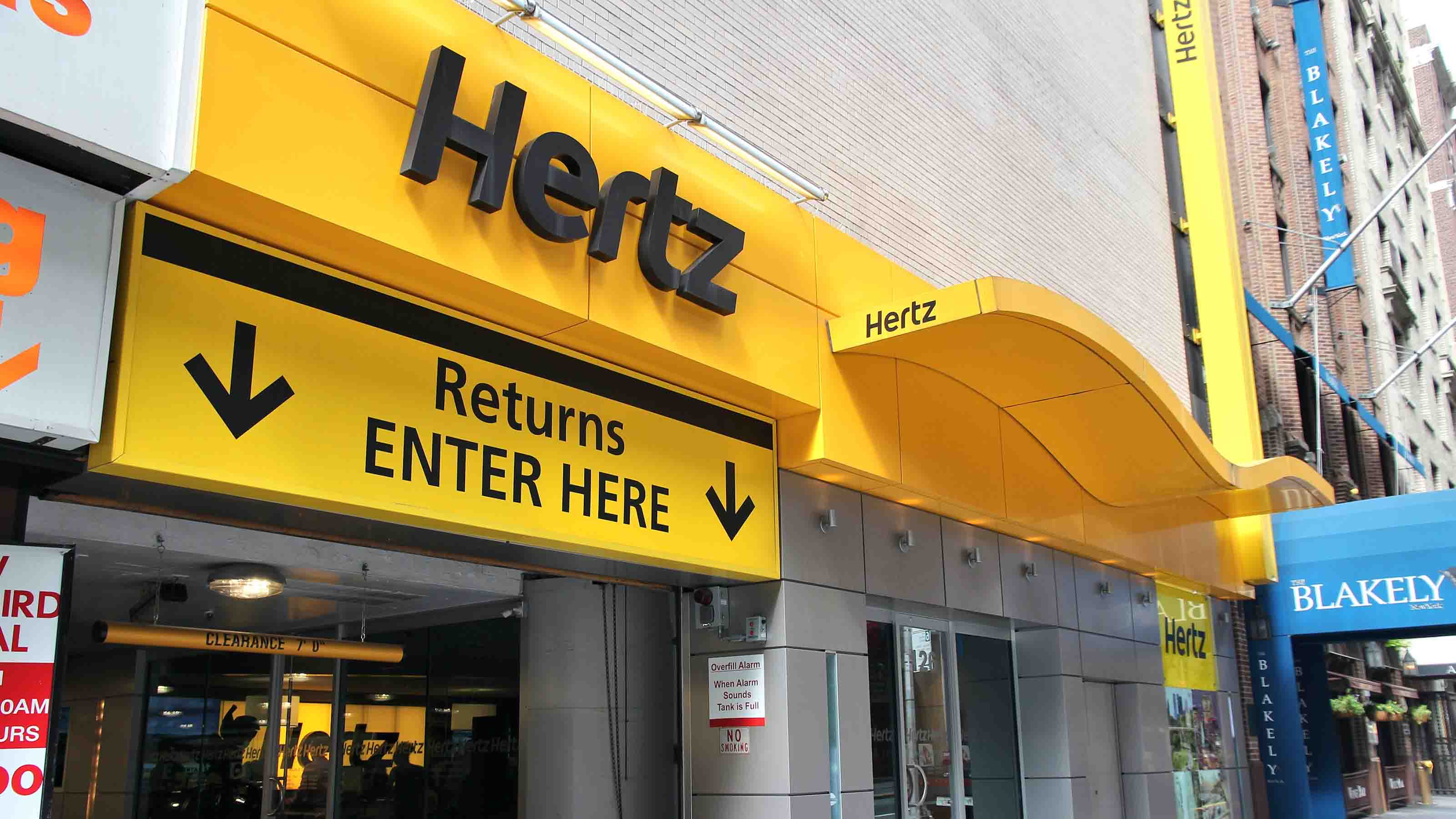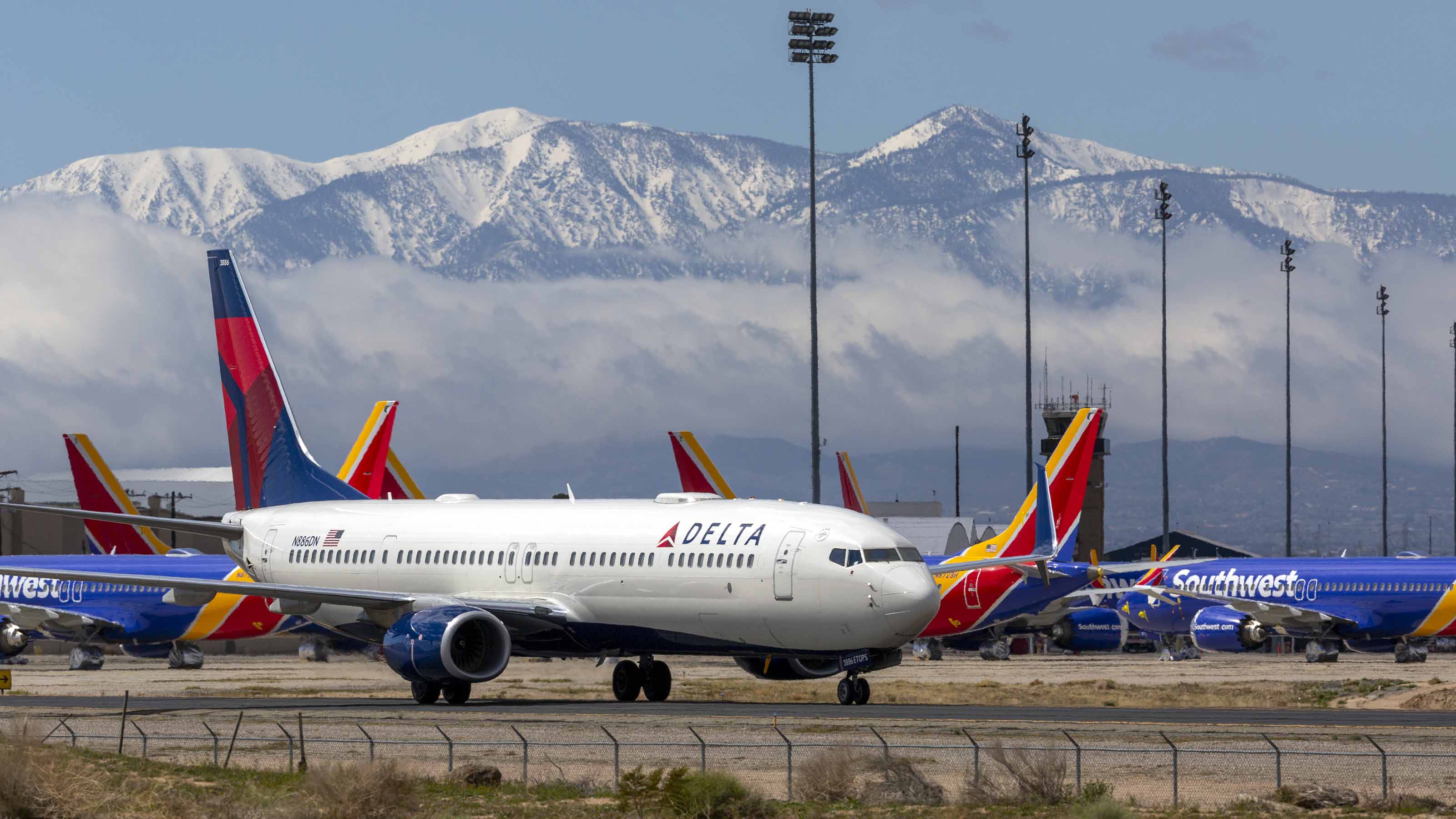7 Travel Stocks to Buy as COVID Cases Retreat
After living through two years of a pandemic, consumers are ready to hit the open road – and these top-rated travel stocks could reap the rewards.


Profit and prosper with the best of Kiplinger's advice on investing, taxes, retirement, personal finance and much more. Delivered daily. Enter your email in the box and click Sign Me Up.
You are now subscribed
Your newsletter sign-up was successful
Want to add more newsletters?

Delivered daily
Kiplinger Today
Profit and prosper with the best of Kiplinger's advice on investing, taxes, retirement, personal finance and much more delivered daily. Smart money moves start here.

Sent five days a week
Kiplinger A Step Ahead
Get practical help to make better financial decisions in your everyday life, from spending to savings on top deals.

Delivered daily
Kiplinger Closing Bell
Get today's biggest financial and investing headlines delivered to your inbox every day the U.S. stock market is open.

Sent twice a week
Kiplinger Adviser Intel
Financial pros across the country share best practices and fresh tactics to preserve and grow your wealth.

Delivered weekly
Kiplinger Tax Tips
Trim your federal and state tax bills with practical tax-planning and tax-cutting strategies.

Sent twice a week
Kiplinger Retirement Tips
Your twice-a-week guide to planning and enjoying a financially secure and richly rewarding retirement

Sent bimonthly.
Kiplinger Adviser Angle
Insights for advisers, wealth managers and other financial professionals.

Sent twice a week
Kiplinger Investing Weekly
Your twice-a-week roundup of promising stocks, funds, companies and industries you should consider, ones you should avoid, and why.

Sent weekly for six weeks
Kiplinger Invest for Retirement
Your step-by-step six-part series on how to invest for retirement, from devising a successful strategy to exactly which investments to choose.
Americans and their global counterparts are getting ready to enjoy a more open world in 2022 – good news for travel stocks.
According to the Centers for Disease Control and Prevention, the seven-day average of COVID-19 cases in the U.S. is at its lowest level since last summer.
"After more than a year of waiting, travel stocks may finally be recovering," says David Russell, vice president of Market Intelligence at online trading platform TradeStation. "The reason for the growth in the industry is credited primarily to the decreasing COVID-19 cases due to vaccines developed in late 2020. Consumers are eager to travel again, which has cued investors to begin to reaccumulate travel stocks, bolstering the market."
Additionally, in its 2022 outlook, Expedia Group, in collaboration with Wakefield Research, surveyed 5,500 individuals from across the globe – including the U.S., U.K. and Canada. Of those surveyed, 81% said they plan to take at least one vacation with family and friends over the first half of 2022. And more than half of respondents said they will spend more on travel than they did pre-pandemic.
"Travel is about to experience a year unlike ever before as people plan purpose-driven trips, value vacation time more, and up their investment in unique experiences," says Ariane Gorin, president of Expedia for Business.
With that in mind, here are seven travel stocks that will benefit from consumers' pent-up demand for vacation. This list covers a variety of travel-related industries, including hotel stocks, airlines and entertainment. But all the names featured here have at least one thing in common: They are top-rated among Wall Street pros.
Data is as of April 3. Analysts' opinions courtesy of S&P Global Market Intelligence. Stocks are listed by analysts' consensus recommendation, from lowest to highest.

Marriott International
- Industry: Lodging
- Market value: $56.8 billion
- Analysts' consensus recommendation: 2.41 (Buy)
Marriott International (MAR, $173.68) was busy adding to and building its worldwide pipeline of hotel rooms over the past year. In 2021, the operator of 30 hotel and lodging brands signed 599 agreements to build 92,000 future rooms, more than half outside the U.S. and Canada.
With 2021's signings, Marriott now has 495,000 rooms under development worldwide. That adds to its existing footprint of 1.48 million rooms at almost 8,000 properties in 139 countries. Despite hurdles faced by the pandemic, MAR was able to open an additional 86,000 rooms last year, 3.9% higher than in 2020.
Marriott has three key growth areas: Luxury travel, leisure travel and branded residential.
Of the three, luxury appears ready to take off in 2022. Marriott is set to launch more than 30 luxury hotels this year under its St. Regis, W Hotels, Ritz-Carlton, JW Marriott and more to meet the demand. In total, the company has seven luxury brands associated with 476 hotels.
The luxury segment provides the company with higher fees than its moderate banners. For this reason, it has almost 50,000 hotel rooms in its luxury pipeline.
In 2021, Marriott's revenue per available room (RevPAR) in its U.S. and Canadian luxury hotels was $190.53, nearly double what it was in 2020. In addition, the average daily rate at these hotels was $393.72, 12.9% higher year-over-year.
Overall, Marriott had gross fee revenues of $2.7 billion for all of 2021, 60% higher than the year earlier. These improvements translated into an adjusted net income of $1.1 billion, a considerable improvement over the $267 million loss it incurred in 2020.
While COVID-19 variants may do their best to slow reopenings, the writing is on the wall. And travel stocks like MAR will benefit in 2022 from a return to a more normal hospitality industry.

Airbnb
- Industry: Travel services
- Market value: $111.3 billion
- Analysts' consensus recommendation: 2.39 (Buy)
Airbnb (ABNB, $173.07) CEO Brian Chesky announced on Twitter in mid-January that he would be working remotely in Atlanta and other cities throughout 2022 to better understand the Live Anywhere trend that's exploding worldwide. So, each week he's working in a town away from ABNB's home office in San Francisco and living on Airbnb.
In Chesky's tweet, he noted several statistics driving the Live Anywhere phenomenon, including the fact that between July and September of last year, 20% of gross nights booked were for stays of 28 days or longer. And more than 100,000 people booked stays of at least three months in the 12 months through September.
People aren't just staying in big cities or resort towns, they're also staying in rural areas. According to Airbnb, in Q3 2021, domestic nights booked by U.S. guests for rural stays increased 85% over Q3 2019.
The digital nomad visa has become a thing too. So you want to work in Croatia, it's no problem. There are now approximately 41 countries offering this new type of visa.
Naturally, Chesky is very optimistic about his company's future – and for good reason. In 2021, ABNB brought in $47 billion in gross bookings volume (GBV), nearly double what it did in 2020 and 23% higher than in 2019. Additionally, adjusted EBITDA (earnings before interest, taxes, depreciation and amortization) margin in the previous fiscal year was 27%, compared to an adjusted EBITDA margin of -5% in 2019.
And ABNB ended last year with $8.3 billion in cash, cash equivalents, marketable securities and restricted cash, while holding $3.7 billion in funds on behalf of guests.
The company admitted in its Q4 shareholder report that it's "challenging" to give guidance too far out due to COVID-19-related uncertainties. Still, Airbnb says it is "encouraged" by what it's seeing for 2022 travel trends, including lead times for first-quarter bookings in the U.S. and Europe exceeding those seen in Q1 2019.
Based on a price-to-sales ratio of 13.1x its 2022 estimate, its valuation is the cheapest it's been since going public in December 2020.

Royal Caribbean Cruises
- Industry: Travel services
- Market value: $21.3 billion
- Analysts' consensus recommendation: 2.39 (Buy)
Cruise operators were arguably among the hardest-hit travel stocks during the pandemic. Case in point: Royal Caribbean Cruises (RCL, $83.66). The company has $11 billion in revenue in 2019. In 2020, that figure had tumbled to $2.2 billion, and fell even further – to $1.5 billion – in 2021.
But analysts' expectations are for a big recovery over the next two years. Consensus estimates are for fiscal 2022 revenue to hit $9.3 billion, and rise to $12.6 billion in 2023.
"We view cruise lines as one of the few remaining recovery stories in consumer, offering high operating leverage that should become a tailwind into 2023 as business returns to normal," says Wells Fargo analyst Daniel Politzer.
While the analyst believes near-term performance hinges on progress toward resuming operations as well as volatility sparked by geopolitical risks and rising fuel prices, "the bull thesis remains intact for cruise penetration to grow over time, with North America the most mature market." Politzer has an Outperform rating on RCL, which is the equivalent of Buy.
Royal Caribbean is upbeat about its future too. While CEO Jason Liberty – who took the reins from long-time leader Richard Fain in early January – said the omicron variant " was particularly unfortunate for the first half of 2022 bookings and will likely delay our return to profitability by a few months," it will not impact RCL's overall recovery.
Liberty also says he expects 2022 will be "a strong transitional year."

Hertz Global Holdings
- Industry: Rental & leasing services
- Market value: $9.1 billion
- Analysts' consensus recommendation: 2.00 (Buy)
Heading into the new year, Barron's said it expects rental car companies to be among the best travel stocks in 2022 due to ongoing vehicle shortages that have created a higher-pricing environment. The financial publication tapped Hertz Global Holdings (HTZ, $21.12) as a top stock pick.
Many on Wall Street share in this optimism. Of the nine analysts following the stock tracked by S&P Global Market Intelligence, three say it's a Strong Buy, three call it a Buy and three have it at Hold. What's more, HTZ was a top stock pick among billionaire investors in the fourth quarter.
"Hertz is an industry leader in the rental vehicle market," says Oppenheimer analyst Ian Zaffino (Outperform). "It has a strong balance sheet, a significantly optimized cost structure, and impressive partnerships with Uber (UBER), Tesla (TSLA) and Carvana (CVNA)."
In HTZ's most recent earnings report, the company reported higher-than-expected fourth-quarter adjusted EBITDA of $628 million and revenues of $1.9 billion. The company also said it ended 2021 with $3.2 billion in liquidity – a figure that includes $2.3 billion in unrestricted cash, a solid position to fund strategic initiatives.
Deutsche Bank analyst Chris Woronka (Buy) says this "cash windfall will likely accelerate in 2022," which "should drive large buybacks."
Pretty impressive considering the company only emerged from Chapter 11 bankruptcy protection in June 2021 after filing for it in May 2020.

Ryman Hospitality Properties
- Industry: REIT – hotel & motel
- Market value: $5.2 billion
- Analysts' consensus recommendation: 2.00 (Buy)
Ryman Hospitality Properties (RHP, $94.35) is one of those travel stocks that fly under the radar of many investors. This is because it's partly a hotel owner and operator and partly a hospitality business. But most importantly, it's a Nashville-based real estate investment trust (REIT).
Its most famous assets include the Grand Ole Opry and Ryman Auditorium, but it has many other revenue-generating properties held within its two operating segments: Hospitality and entertainment.
In addition to the two properties mentioned above, the entertainment segment includes a growing list of country brands, including Ole Red – a bar, restaurant and performing arts venue backed by singer Blake Shelton. The hospitality segment is made up of Gaylor resorts across Tennessee, Florida, Texas, Maryland and Colorado.
The REIT's overall revenues grew 79.1% in fiscal 2021 to $939.4 million. Revenue in its more significant hospitality segment spiked 68.8% year-over-year to $786.6 million.
Analysts expect strong revenue growth in fiscal 2022, with the consensus estimate at $1.6 billion – a 65.7% YoY improvement. The company is also projected to report earnings of $1.58 per share, a marked improvement over the $3.21 per-share loss it recorded in 2021.
Helping Ryman along are expansion plans, with the REIT opening a 5,000 to 6,000 square feet Ole Red location at the Nashville International Airport in the year ahead. Then, in 2023, it plans to open one in Las Vegas, its first location in the Western U.S. This one will be big, at four stories and roughly 27,000 square feet. Ryman plans to spend $30 million developing the building and Ole Red location.
It also hopes to grow the Block 21 mixed-use entertainment complex it acquired in October for $260 million. The Block 21 complex in Austin, Texas, includes a 251-room W Hotel and the Austin City Limits concert venue.
For investors looking for the best travel stocks, Ryman Hospitality Properties is an absolute diamond in the rough.

Delta Air Lines
- Industry: Airlines
- Market value: $25.2 billion
- Analysts' consensus recommendation: 1.58 (Buy)
There's no denying that it has been a tough couple of years for Delta Air Lines (DAL, $39.31).
While the spread of COVID-19 kept passengers from flying early in the pandemic, the omicron variant kept the airline from fielding enough staff in late 2021 and early 2022. According to The New York Times, more than 8,000 Delta employees called in sick in the last weeks of 2021, forcing the company to cancel thousands of flights.
The good news for Delta shareholders is that the impact from omicron was short-lived.
"Omicron is expected to temporarily delay the demand recovery 60 days, but as we look past the peak, we are confident in a strong spring and summer travel season with significant pent-up demand for consumer and business travel," CEO Ed Bastian said in Delta's Q4 2021 press release.
And yes, it's true, the airline's financial results in 2021 were grim. Revenues on an adjusted basis were down 43% from 2019 to $26.7 billion. On the bottom line, its adjusted loss was $2.6 billion, down significantly from the $4.8 billion profit it reported two years ago.
Still, Delta generated $1.3 billion in free cash flow – the money remaining after a company has paid its expenses, interest on debt, taxes and long-term investments needed to grow its business – in 2021. While that is below the $4.2 billion it had in 2019, the fact that it was positive in such a tough business environment speaks to Bastian and his team's work last year keeping the business afloat.
And analysts expect DAL to swing to a profit of $1.49 per share in 2022, while bringing in revenues of $43.4 billion – both significant improvements over its results in 2021.

Walt Disney
- Industry: Entertainment
- Market value: $249.4 billion
- Analysts' consensus recommendation: 1.79 (Buy)
Long-time Walt Disney (DIS, $137.00) shareholders have taken it on the chin in recent years. According to Morningstar, you have to go back 15 years for the company to deliver a higher annualized total return (10.31%) than the entire U.S. market (10.28%). Every other time frame, Disney underperforms.
The pandemic certainly didn't help.
In the fiscal year ended Oct. 2, 2021, Disney's revenues grew 3% over 2020 to $67.4 billion, while its segment operating income fell 4% YoY to $7.8 billion. On the free cash flow front, it generated $2.0 billion, 45% less than a year earlier.
So, why is DIS on a list of the best travel stocks?
For starters, its Disney Parks, Experiences and Products segment performed admirably despite COVID-19 affecting its first-half performance. On the top line, it had $16.6 billion in revenue, 3% less than a year earlier. However, its operating income was $471 million, 4% higher than in 2020.
Another piece of the puzzle for DIS – and an important one at that – is Disney+. In 2021, Disney grew its video-streaming direct-to-consumer (DTC) revenue by 55% to $16.3 billion. This accounted for 32% of Disney's Media and Entertainment Distribution revenues. That's 10% higher than in 2020.
Disney finished its fiscal year with 179 million DTC subscribers, including for Disney+, Hulu and ESPN+. Disney+ took the lion's share of subscribers, up 60% YoY to 118.1 million. Over the next two years, Disney will expand its streaming service into more than 50 new markets worldwide, including South Africa and Croatia.
Wellington-Altus Private Wealth portfolio manager Rick Stuchberry believes the Dow Jones stock is anything but dead. He's made it one of his top picks for 2022.
"People look at it and say 'Oh gee, well everything's going wrong at Disney,' but it isn't," Stuchberry said. "The market's taken it down. The streaming business looks pretty good, but the theme parks, they're not running it where they should be because of the COVID thing, but once the COVID passes? You're getting movie libraries, you're getting the whole package and Disney at a very good price now," the Cantech Letter reported.
If that's not enough, the highest-rated travel stock on this list hasn't been this cheap since 2019 based on its price-to-sales ratio of 3.7x.
Profit and prosper with the best of Kiplinger's advice on investing, taxes, retirement, personal finance and much more. Delivered daily. Enter your email in the box and click Sign Me Up.

Will has written professionally for investment and finance publications in both the U.S. and Canada since 2004. A native of Toronto, Canada, his sole objective is to help people become better and more informed investors. Fascinated by how companies make money, he's a keen student of business history. Married and now living in Halifax, Nova Scotia, he's also got an interest in equity and debt crowdfunding.
-
 Nasdaq Leads a Rocky Risk-On Rally: Stock Market Today
Nasdaq Leads a Rocky Risk-On Rally: Stock Market TodayAnother worrying bout of late-session weakness couldn't take down the main equity indexes on Wednesday.
-
 Quiz: Do You Know How to Avoid the "Medigap Trap?"
Quiz: Do You Know How to Avoid the "Medigap Trap?"Quiz Test your basic knowledge of the "Medigap Trap" in our quick quiz.
-
 5 Top Tax-Efficient Mutual Funds for Smarter Investing
5 Top Tax-Efficient Mutual Funds for Smarter InvestingMutual funds are many things, but "tax-friendly" usually isn't one of them. These are the exceptions.
-
 Fed Vibes Lift Stocks, Dow Up 515 Points: Stock Market Today
Fed Vibes Lift Stocks, Dow Up 515 Points: Stock Market TodayIncoming economic data, including the January jobs report, has been delayed again by another federal government shutdown.
-
 Dow Hits a Record High After December Jobs Report: Stock Market Today
Dow Hits a Record High After December Jobs Report: Stock Market TodayThe S&P 500 also closed the week at its highest level on record, thanks to strong gains for Intel and Vistra.
-
 Dow Dives 797 Points as Government Opens: Stock Market Today
Dow Dives 797 Points as Government Opens: Stock Market TodayThe process of pricing and re-pricing realities old and new never stops, and next week promises to be at least as exciting as this week.
-
 Stocks Retreat as Shutdown Continues: Stock Market Today
Stocks Retreat as Shutdown Continues: Stock Market TodayWhile the main indexes closed lower today, Delta and PepsiCo gained ground on encouraging earnings reports.
-
 Investing Freebies: Perks You Get for Owning These Stocks
Investing Freebies: Perks You Get for Owning These StocksWhile the biggest investing returns come over the long term, these companies offer instant gratification for investors with several freebies and perks.
-
 Stocks Rally on Apple Strength: Stock Market Today
Stocks Rally on Apple Strength: Stock Market TodayThe iPhone maker will boost its U.S. investment by $100 billion, which sent the Dow Jones stock soaring.
-
 Stock Market Today: Solid Signals Lift Stocks Despite Tariff Noise
Stock Market Today: Solid Signals Lift Stocks Despite Tariff NoiseMarkets are whistling over the White House in an ongoing display of corporate America's enduring ability to survive and advance.
-
 Dividend Increases: 3 Stocks With Rising Payouts
Dividend Increases: 3 Stocks With Rising PayoutsWhile dividend growth has been slowing, certain stocks have raised their dividend payouts. These are some selections.
